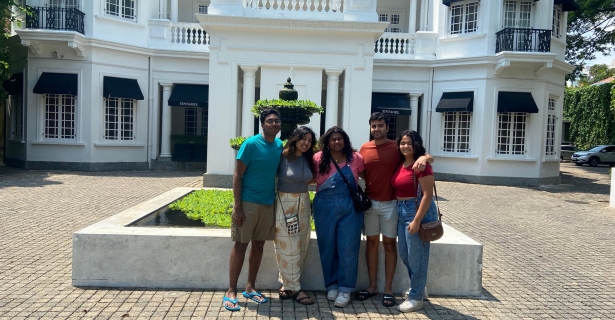Our stay in Sri Lanka began with lunch at the historic Tintagel hotel in Colombo, the former house of the first South Asian female Prime Minister, Sirimavo Bandaranaike. Our hotel was located in the heart of the city, with strong British and Dutch influences. While severely jet lagged, we reached out to local policy institutes and research organizations like Advocata and the Lakshman Kadirgamar Institute. We conversed with Murtaza Jafferjee and Dhananath Fernando at Advocata, who scheduled interviews with various policy experts for the following week. Friday afternoon was spent on communications with various academics, activists, and civil society leaders like heads of non-profit organizations and human rights attorneys.
On Saturday we visited historic Galle and the surrounding areas, touring the old colonial battlements of Galle Fort and the Dutch Hospital district. We learnt much about the legacies of colonial rule, exemplified by the centuries-old fortifications and more surprisingly, a “Verenigde Oostindische Compagnie” (the Dutch East India Company)-themed cafe. In Galle, and many towns ‘down south’, local restaurants, bars, and cafés make a concerted effort to cater to European visitors. The economy of Sri Lanka had been hit hard by Covid-19, which gutted the tourism sector on the island. In an effort to attract tourists, especially wealthier ones who can afford to come to Sri Lanka, locals have put up signs in Russian and French. Despite the depredation caused by the pandemic, locals were friendly and conversational. At the Meera Masjid, workers in the mosque shared their experiences of being Muslim in Sri Lanka. They highlighted the differences in treatment in coastal communities versus inland communities, noting that coastal towns tended to be more heterogeneous and cosmopolitan, and therefore more harmonious. Galle Fort was a prime example of peaceful communitarian coexistence. However, the shadow of Covid-19 falls over the island as Sri Lankans lament the price of fuel due to the falling value of the Lankan rupee against the dollar. Inflation and unemployment have risen dramatically in the last few years, and it is especially apparent in the once-vibrant tourist towns of Bentota and Hikkaduwa.

